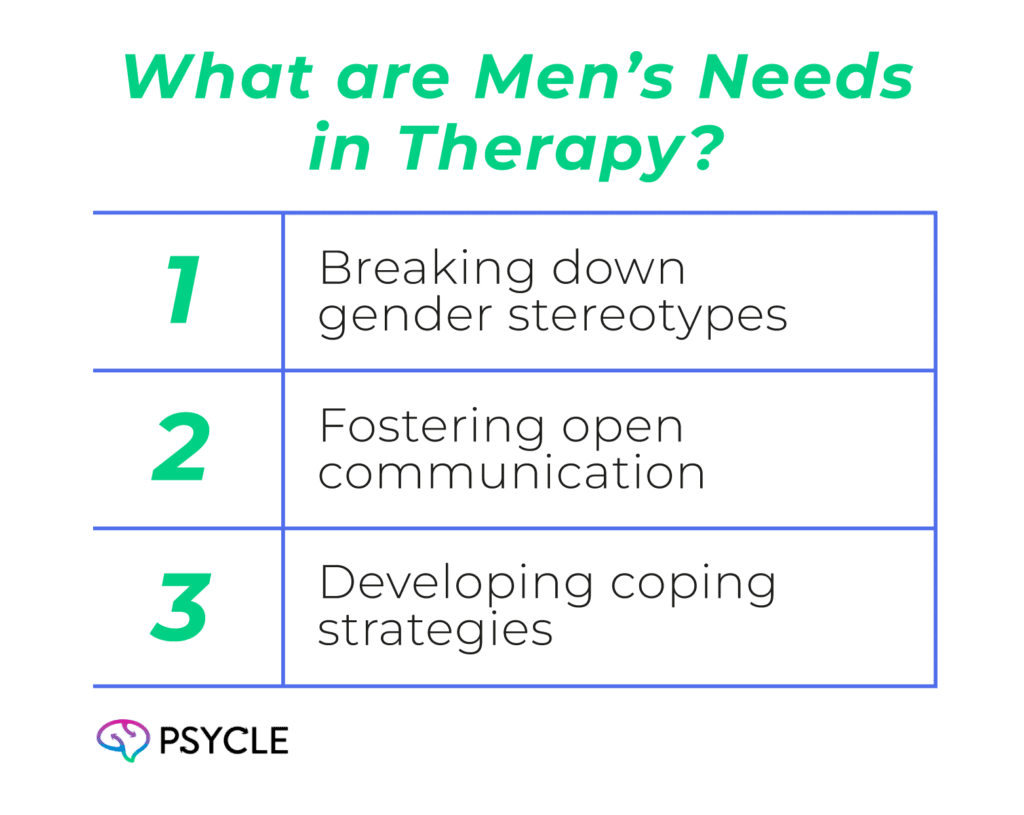Men often find it hard to seek mental health support due to the social pressures and stigma about showing emotions they face. This can make it hard for them to open up and deal with their mental health issues. However, therapy can make a big positive change in their lives.
Therapists need to understand how men experience mental health problems so they can provide the right support. They can create a safe space for men. In this space, men can feel encouraged to face their challenges. This is a big step toward improving their mental well-being.
Key Takeaways
- Pressure and stigma make it hard for men to seek help for their emotional issues.
- Men might show signs of mental health problems differently, such as being angry or turning to substance abuse.
- Good therapy for men includes shattering stereotypes, encouraging honest talk, and creating unique plans for coping.
- It’s vital for men to find a therapist they connect with. The right therapist can understand their needs and help them set achievable goals.
- Therapies like Cognitive-Behavioral Therapy (CBT), using mindfulness, and group therapy can benefit men’s mental health issues a lot.
Men’s Mental Health Crisis
In today’s world, mental health is a hot topic, but men’s mental health statistics reveal a worrying trend. This data urgently needs our attention.
Alarming Statistics on Men’s Mental Health
Men in the U.S. are 3.6 times more likely to die by suicide than women. This is mainly because they are often hesitant to seek help for mental struggles. Also, 9 percent of U.S. men feel daily depression or anxiety. A large number, one-third of men, also say they’ve faced depression at some point.
Societal Norms and Stigma as Contributing Factors
The notion of societal expectations of masculinity greatly influences men’s behavior towards mental well-being. Many believe that reaching out or showing emotions is a sign of weakness. Overcoming this stigma is vital to creating a culture where all men can get the help they need.
Common Mental Health Concerns for Men
Men face common mental health issues. Recognizing how these concerns show in men is key. It helps in providing support and treatment that works.
Depression and Its Unique Manifestations in Men
Depression in men is often not spotted or wrongly diagnosed because it can look different from what we expect. Instead of being very sad and withdrawn, men might seem angry, irritable, or aggressive. They might have physical symptoms too, like body aches or digestive issues.
Men may also act out in risky ways or lose interest in things they used to love. It’s important to keep an eye out for these signs.
Anxiety and Stress-Related Disorders
Men’s anxiety symptoms can show up in various ways. They might be restless, find it hard to focus, or avoid talking about how they feel. This can lead to bad coping strategies like drinking too much or avoiding situations that make them anxious. It’s a tough issue that needs addressing early.
Trauma and Posttraumatic Stress Disorder (PTSD)
Men can also face severe trauma, which might lead to PTSD. Their experiences with this condition can vary. Some men might be hypervigilant, irritable, or do risky things. This is different from the more stereotypical PTSD symptoms like flashbacks or feeling emotionally numb.
Helping men with PTSD means understanding these differences. It’s important for effective treatment.
Barriers to Seeking Therapy for Men
Many men don’t seek therapy because they think it’ll make them seem weak. This is because of social stigma against men showing their feelings. They worry it’s not manly or shows they’re fragile.
Also, guys often find it hard to talk about their feelings. They might not reach out for help because they think they should deal with it alone. This idea comes from society’s expectation that men will always be strong and not admit when they need help.
What are Men’s Issues in Therapy?
Therapy for men involves more than just talking about problems. It’s about changing how men see themselves, talking openly, and finding better ways to deal with life’s challenges. Creating a supportive space is key. This space allows men to talk about their feelings and not feel judged.

Breaking Down Gender Stereotypes
Men often face pressure to fit into the roles society expects of them. Therapy can help them break free from these stereotypes. Therapists create a place where men can safely question what it means to be a man. This leads to discovering a more real and happy self.
Fostering Open Communication
Many men find it hard to say how they feel. They might think it makes them look weak. Therapists encourage speaking up about emotions without fear. They teach men to express themselves clearly. This improves how they talk to others in their lives, too.
Developing Coping Strategies
Aside from talking, therapy helps men handle stress and anxiety better. Therapists teach techniques such as mindfulness or regular exercise. They show men how to solve problems in a healthy way. This puts men in charge of their mental health for the long run.
Finding the Right Therapist for Men
When seeking a therapist for a man, it’s all about building trust and feeling understood. A great therapist has the right skills and experience to help with what you need. They make a safe space where you can share your feelings without fear.
Establishing Rapport and Trust
Feeling comfortable with your therapist is key. They should really listen, respect your experiences, and show they care. A therapist skilled in creating a connection and trust can make it easier for you to talk and make progress.
Therapist’s Experience and Credentials
Looking for a good therapist means checking their background in helping men. The best ones have special training and know the mental health needs of men well. They should be experienced with men’s issues, making their help more effective.
Goal-Setting and Action Plans
Good therapy for men is about setting real goals and working towards them. A qualified therapist makes a plan with you that’s clear and doable. They help you stay focused and progress, which can boost your confidence and lead to real changes.
Explore therapists through phone calls before you decide. This way, you can see if someone meets your needs and feels right before you commit.
Therapeutic Approaches for Men’s Mental Health
Therapists use proven methods to help men dealing with mental health issues. Three top therapies are Cognitive-Behavioral Therapy (CBT), mindfulness, and group therapy. Each approach offers unique benefits for men’s mental well-being.
Cognitive-Behavioral Therapy (CBT)
CBT is a great fit for many men. It tackles negative thinking and sets up new, better ways to cope. This helps men take control of their mental issues like depression and anxiety.
Mindfulness-Based Interventions
Mindfulness helps men understand and manage their thoughts and feelings. It’s about being aware of yourself without criticism. For men not used to talking about their emotions, mindfulness can be a breakthrough.
Group Therapy for Men
Group therapy offers men a chance to connect with others facing similar challenges. They can share stories and learn from each other. This support can make a big difference for those who’ve felt alone in their struggles.
Addressing Substance Abuse and Addiction
Many men deal with addiction as well as mental health problems. Therapists should deal with both together. This helps men get better in the long run and feel well overall.
Co-occurring Disorders and Dual Diagnosis
Having mental health issues (like depression) and addiction at the same time.can make each problem worse. This makes getting better harder. Skilled therapists need to spot and treat both to give good care.
Integrated Treatment Approaches
When treating men with addiction and other health problems, a mix of therapies is used. This might include talking one-on-one, in groups, using medications, and getting help from other places. This helps men to understand their problems fully. It also gives them the tools to stay well in the future.
Substance abuse, dual diagnosis, and integrated treatment are vital parts of helping men beat their troubles. A caring and proven method helps men get their lives back on track.
Supporting Men’s Mental Health
Supporting men’s mental health starts by talking openly and showing how important it is to take care of yourself. Friends and family should show they understand how the man feels and help them find what they need.
Men should make time for things that keep them healthy, like working out, managing stress, and getting help from experts when they need it. Feeling safe to talk about emotions and get help can make a big difference in how men feel.
Encouraging Open Dialogue
It’s important to talk freely about men’s mental health. Begin by making a safe space for conversations at home. This means letting men share their worries without fear of judgment. Understanding and support can help open the door to talk about mental health, showing men that asking for help is not a sign of weakness.
Promoting Self-Care and Healthy Coping Mechanisms
Looking after yourself and finding good ways to cope is crucial for men’s mental well-being. It’s good to suggest staying active, learning how to manage stress with techniques like meditation, and not being afraid to get help when they need it. Encouraging healthy habits and seeking professional support helps men handle life’s challenges better.
Breaking the Silence on Men’s Mental Health
It’s vital to talk more about men’s mental health to end the silence. We need to teach people, change what they think, and offer support for men. By doing this, we can help more men find the courage to look for help.
Raising Awareness and Reducing Stigma
We have to make men’s mental health known and fight the stigma. Talking about the mental struggles men face helps. It shows that it’s okay for men to talk about feelings and struggles.
Resources and Support Services for Men
To help men’s mental health, we need special services and resources. These can include helplines, online groups, and therapy for men. These mental health resources should be easy to reach. Doing this can encourage men to start dealing with their mental health.
By working on these three things, we can make a big change. We can end the silence around men’s mental health. Then, more men might feel prepared to take care of their well-being.
Conclusion
Helping men with their mental health is crucial in therapy. It lets men deal with their problems better. Therapists can help by understanding issues like societal norms and the difficulty men have in showing emotions.
Therapy breaks down the old stereotypes about men. It encourages talking about feelings openly. This, along with proven treatments, can make a big difference. Men can learn how to deal with emotions better and find healthier ways to cope with life’s stressors.
It’s vital to support men’s mental health. We need to make it easier for them to ask for help. This means giving them a safe place to get better. When we talk openly and help reduce the shame around men’s mental health, more men will take care of themselves. The path to a happier life for men starts with talking and offering the right help.
FAQs
What are the Unique Challenges Men Face in Therapy?
Men may find it hard to talk about emotions in therapy. They often face cultural barriers to seeking help. These include societal expectations and fear of being judged.
What are the Alarming Statistics on Men’s Mental Health?
Men in the U.S. are more likely to die by suicide than women. Nine percent say they feel daily depression or anxiety. A third of men have faced depression in their life.
How Do Men Often Experience and Express Mental Health Concerns?
Men sometimes show different signs of depression. They might get angry or act out. They might avoid talking about how they feel. They may also turn to alcohol or drugs.

